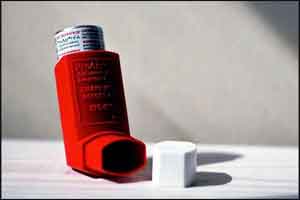- Home
- Editorial
- News
- Practice Guidelines
- Anesthesiology Guidelines
- Cancer Guidelines
- Cardiac Sciences Guidelines
- Critical Care Guidelines
- Dentistry Guidelines
- Dermatology Guidelines
- Diabetes and Endo Guidelines
- Diagnostics Guidelines
- ENT Guidelines
- Featured Practice Guidelines
- Gastroenterology Guidelines
- Geriatrics Guidelines
- Medicine Guidelines
- Nephrology Guidelines
- Neurosciences Guidelines
- Obs and Gynae Guidelines
- Ophthalmology Guidelines
- Orthopaedics Guidelines
- Paediatrics Guidelines
- Psychiatry Guidelines
- Pulmonology Guidelines
- Radiology Guidelines
- Surgery Guidelines
- Urology Guidelines
Escalating inhaled steroid dosages doesn't not prevent asthma flare-ups in children

Asthma flare-ups in children are common and costly, and to prevent them, many health professionals recommend increasing the doses of inhaled steroids from low to high at early signs of symptoms, such as coughing, wheezing, and shortness of breath. Dr.Daniel Jackson, at the University of Wisconsin School of Medicine and Public Health, Madison and co-researchers tested the safety and efficacy of this strategy in children with mild-to-moderate asthma.The researchers reported that escalating inhaled steroid dosages to five times the normal dose early in an asthma flare-up failed to prevent exacerbations or minimize their severity in a study of children with mild-to-moderate persistent asthma.The study has appeared online in the New England Journal of Medicine (NEJM) to coincide with its presentation at a meeting of the 2018 Joint Congress of the American Academy of Allergy, Asthma & Immunology (AAAAI) and the World Allergy Organization (WAO) in Orlando, Florida.
"These findings suggest that a short-term increase to high-dose inhaled steroids should not be routinely included in asthma treatment plans for children with mild-moderate asthma who are regularly using low-dose inhaled corticosteroids," said study leader Daniel Jackson, M.D., associate professor of pediatrics at the University of Wisconsin School of Medicine and Public Health, Madison, and an expert on childhood asthma. "Low-dose inhaled steroids remain the cornerstone of daily treatment in affected children."
The research team studied 254 children 5 to 11 years of age with mild-to-moderate asthma for nearly a year. All the children were treated with low-dose inhaled corticosteroids (two puffs from an inhaler twice daily). At the earliest signs of asthma flare-up, which some children experienced multiple times throughout the year, the researchers continued giving low-dose inhaled steroids to half of the children and increased to high-dose inhaled steroids (five times the standard dose) in the other half, twice daily for seven days during each episode.
Though the children in the high-dose group had 14 percent more exposure to inhaled steroids than the low-dose group, they did not experience fewer severe flare-ups. The number of asthma symptoms, the length of time until the first severe flare-up, and the use of albuterol (a drug used as a rescue medication for asthma symptoms) were similar between the two groups.
Unexpectedly, the investigators found that the rate of growth of children in the short-term high-dose strategy group was about 0.23 centimeters per year less than the rate for children in the low-dose strategy group, even though the high-dose treatments were given only about two weeks per year on average. While the growth difference was small, the finding echoes previous studies showing that children who take inhaled corticosteroids for asthma may experience a small negative impact on their growth rate. More frequent or prolonged high-dose steroid use in children might increase this adverse effect, the researchers caution.
The study did not include children with asthma who do not take inhaled steroids regularly, nor did it include adults. "This study allows caregivers to make informed decisions about how to treat their young patients with asthma," said James Kiley, Ph.D., director of the NHLBI's Division of Lung Diseases. "Trials like this can be used in the development of treatment guidelines for children with asthma."
For more details click on the link: New England Journal of Medicine, 2018; DOI: 10.1056/NEJMoa1710988

Disclaimer: This site is primarily intended for healthcare professionals. Any content/information on this website does not replace the advice of medical and/or health professionals and should not be construed as medical/diagnostic advice/endorsement or prescription. Use of this site is subject to our terms of use, privacy policy, advertisement policy. © 2020 Minerva Medical Treatment Pvt Ltd